Pros and Cons of a Resin Driveway – Are They Worth Buying?
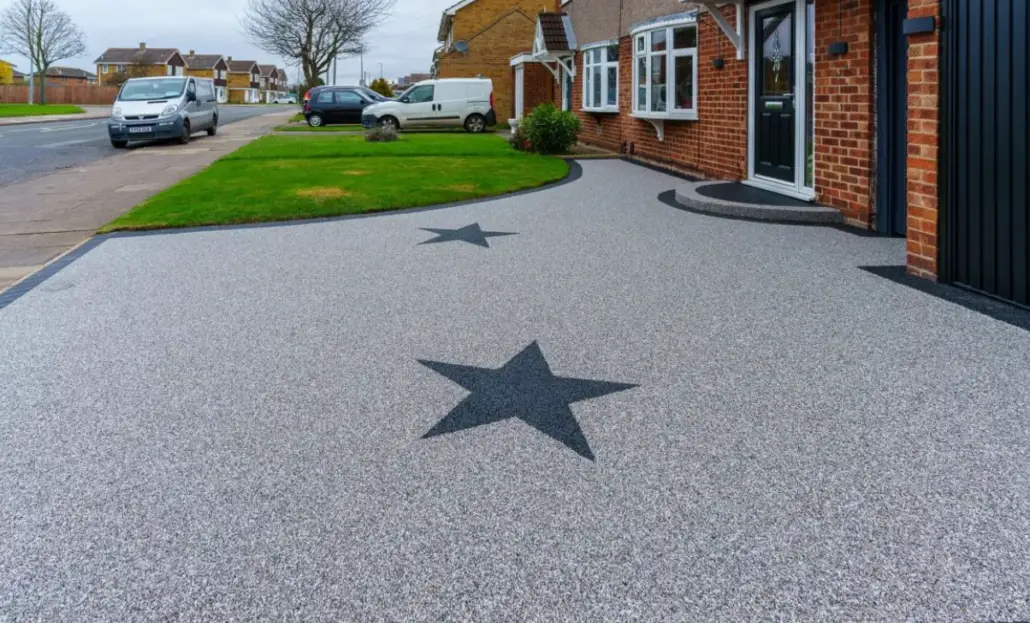
When designing gardens and driveways, homeowners can choose from various landscaping ideas. Gravel, block paving, stone, concrete, and resin are some materials available for driveways.
Although resin aggregates are rarely seen as a viable option for driveways, they have many advantages.
Resin can be a surface material in various contexts, and its aesthetic versatility depends on the final look you’re going for. Resin’s variety of colors allows you to design an entryway just right for you, your family, and your guests.
The resin driveway also has a great finish that meets Sustainable Urban Drainage System (SUDS) standards because it has a porous surface.
Overview
Resin surfaces, unlike gravel, last for a very long time since there are no loose stones, and the finish is durable. Resin driveways are also ideal and more accessible for people using wheelchairs or strollers because they are smooth and easy to use.
Nonetheless, expensive installation and difficulty in repairing are some downsides of resin surfaces.
Advantages Of Resin Driveways
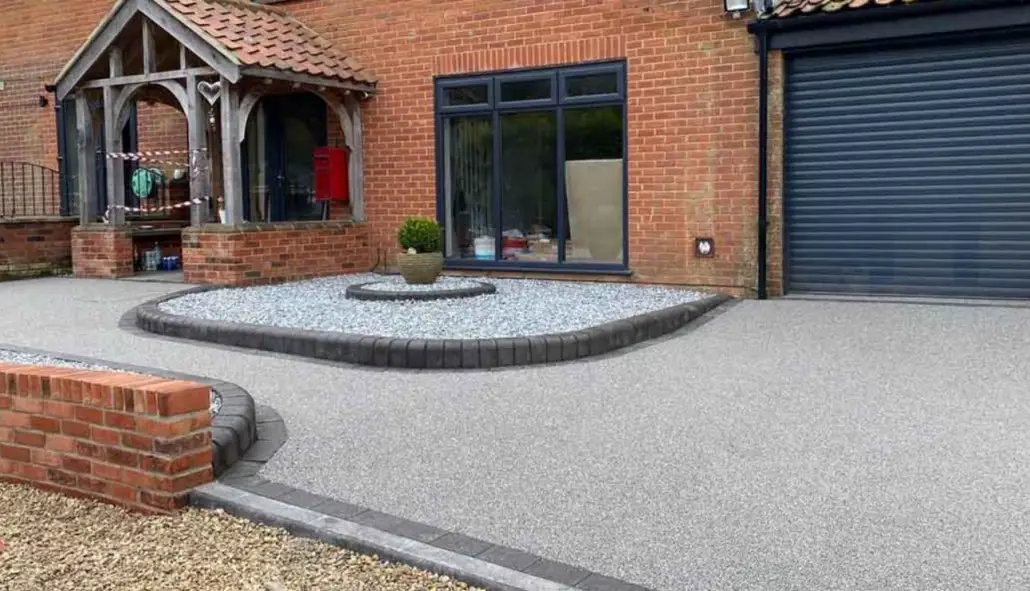
You should be familiar with resin-bound surfacing by this point. There are many advantages to having a resin-bound driveway, not the least of which is that it is simple to install and results in a smooth surface. Here are a few more advantages:
Cost Effective
You can tell how affordable a resin-bound driveway is by doing the math. Think about how long your resin-bound pavement will last before deciding on the cost of purchase and installation. Resin-bound driveways are more cost-effective than other types because they last a long time. Remember that you will only need to spend a little money on repairs or maintenance over the long run.
Quick to Install
Resin-based driveway solutions are quicker to install than other options. Although the average installation only takes a few days, you should always plan to account for the weather. If it rains too much, the glue that holds the aggregate together might not stick either.
Require Little Maintenance
The reduced frequency of required upkeep is a bonus. Bricks or stones in a driveway may need to be moved around occasionally. Also, tearing out weeds may be necessary at times.
However, with a resin-bound driveway, you won’t have to worry about any of that. Strong and long-lasting, the resin is an excellent construction material. Taking care of your driveway this way will keep it looking great for a long time.
Looks Great
Your driveway could become an architectural highlight that sets off your house and landscaping with the right paving. The driveway will form visitors’ first impression of your home. To make a good first impression on guests, you must have the most attractive driveway possible.
The surface of a resin-bound driveway is so sleek and shiny that it seems almost silky. There are no uneven spots or loose stones like there often are in resin-bonded driveways. It’s also a great option for setting your driveway apart from the rest of the neighborhood.
You can achieve many colors by combining various resins and aggregates. For your home to stand out from the rest, you should use an accent color that complements the exterior.
Resin Driveways Have a Variety of Color and Design Choices
There’s a wide array of color schemes to choose from. You can, therefore, pick a driveway that matches the rest of the property.
On the other hand, one can go for a driveway layout that features a stark but aesthetically pleasing contrast. You’re free to design your driveway however you like. The only limit is your creativity.
Great Drainage & Flood Prevention
The porous nature of resin-bound driveways sets them apart from other driveways. That way, you can avoid installing any additional drains in your driveway. Most people don’t like it when it rains because their driveways get flooded, or puddles form.
Resin-bound driveways are permeable, so water that runs off the surface can seep into the soil. So there won’t be any standing water on your driveway to cause any problems. Also, because each particle is covered with resin, the aggregate drains faster and better.
Durable
When deciding on a driveway paving material, durability should be a top priority. You can see the damage that rain or extreme heat does to concrete and asphalt driveways, even in less severe weather.
On the other hand, even the worst weather can’t hurt driveways that are made of resin. Resin, made from high-quality polyurethane, doesn’t degrade in any climatic conditions.
It is a much better choice than using concrete, which can break when it rains hard and expand and shrink with the weather. Additionally, resins keep their sleek appearance and structural integrity year-round.
It Can Be Placed Easily on Top of Existing Concrete
You can avoid having to start building from square one. You can upgrade your current driveway with resin gravel. As a result, not only will the installation time be cut significantly, but it will also reduce the overall costs.
Resin Reduces Heat Effect
Cities and towns often have heat islands because so much asphalt has been paved. Resin paving solves these issues because it allows the soil below to breathe. As a result, the temperature in those places will drop.
Resin Driveways Add Value To Your Home
Resin driveways are low maintenance and can even increase the value of your home. Homebuyers will gravitate to the product because of its superior quality and the way it stands out from the competition.
For the average person, a home is the largest investment you’ve ever made. Putting money into upkeep and upgrades is a wise move. It is one area where a resin driveway can be useful. As a result, the market value of your home could increase by as much as 20%.
Resin Driveways Are Made From Natural and Sustainable Materials
A resin driveway is a great option if you’re trying to reduce your environmental impact when making purchases. Resin-bound products are made with things like shredded tires and plastic straws.
They are made from marble and aggregate mined from the earth. In this light, resin is worth considering if you care about the ecological footprint of the products you buy.
Disadvantages of Resin Driveways
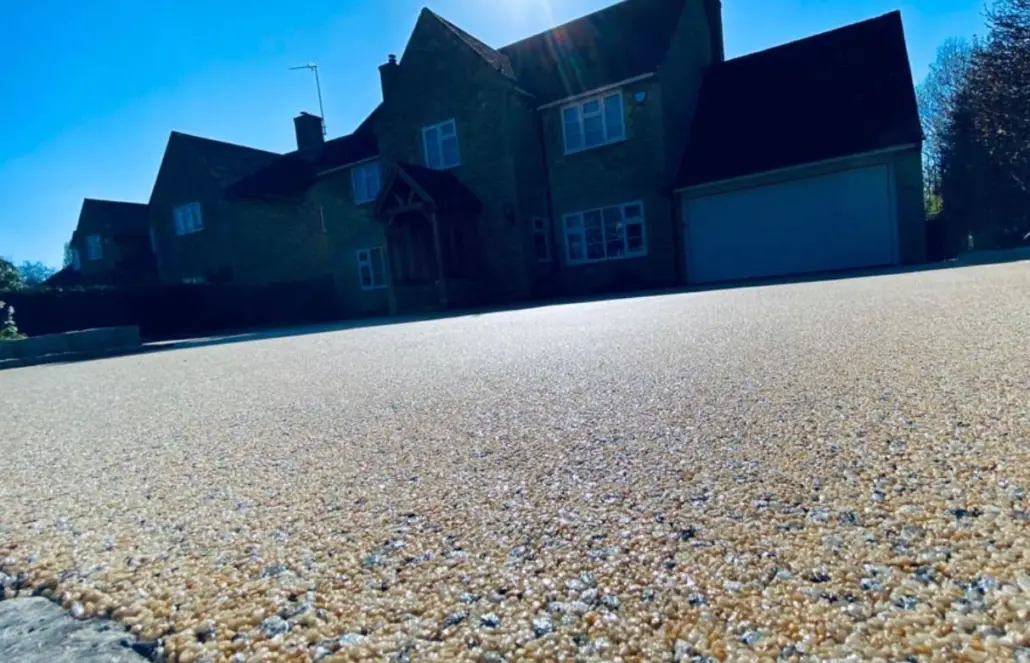
Some disadvantages of using resin-bound surfacing for your driveway are discussed below.
Heavy Usage Can Cause Damage
When the resin-bound driveway is finished, it is important to cure it completely before using it. Since the surface’s strength is still developing, this will likely cause damage.
To prevent anyone from messing with it before it’s cured, you should mark the area with cones and warning tape. The same will apply to heavy usage, even after it has been cured.
Difficult To Repair When Damaged
They are sturdy and long-lasting, but repairs can be difficult if the surface is damaged. When attempting to repair a cracked or chipped surface, you must be careful not to make the damage worse. If the driveway is badly damaged, you may need to replace it entirely.
Can Be Slippery When Wet
A further drawback is that the resin can be dangerously slippery when wet. If pedestrians or cyclists use the driveway, it potentially threatens their safety. With this in mind, you should be careful when it is wet.
Not Suitable for All Climates
In the winter, the finished surface can be quite chilly. Persons walking on the driveway could have their safety compromised. Before installing a resin driveway, keep this in mind, and take extra care in the winter.
There are also reports that they degrade over time when exposed to sunlight. Because of this, the surface’s beauty can fade over time, requiring more effort to revamp.
Finished Surface Can Be Too Glossy
The glossiness of the final product may not appeal to some. It may be a dealbreaker if you’re going for a more natural look. In addition, the glossy finish often requires more work to maintain.
Colors May Fade
Wrong color selection could lead to the use of colors that quickly lose their vibrancy. Overexposure to sunlight is a common cause of this. Therefore, you should pick completely stable colors. You may need to seek expert advice before settling on a color scheme.
Moss Growth
Weeds and moss can flourish in resin-bound systems but are still low maintenance. When this kind of growth occurs, the surface can become very hazardous to walk on, especially if it isn’t regularly cleaned up.
It is also a problem on park footpaths and other well-kept public areas, making them harder to access and putting health and safety at risk.
Can Be Stained
The driveway may become easily damaged if you choose lighter colors. Tire marks and oil stains are two examples of frequently encountered stains. However, these stains are easily removable with the right cleaning products and techniques.
Are Resin Drives Worth the Money?

Resin driveways, on the one hand, have many advantages. They last a long time, need little upkeep, and look good. On the other hand, they can be costly to set up and may only function properly in some climates.
It is, thus, dependent upon your particular requirements and preferences. A resin driveway could be worthwhile if you want a long-lasting, low-maintenance surface.
However, you can always look into alternative driveway materials if you are still looking for more. You can use gravel, asphalt, or concrete for your driveway if you don’t like the look of resin.
People looking to save money often choose to install gravel driveways. They can be set up for a low price and need little in the way of upkeep once they are in place. They aren’t always the easiest to clean and can become filthy when it rains.
Also, asphalt driveways are an affordable choice. They have a long life expectancy (at least 15 years) due to their resilience and repairability. However, they can be loud when driven on and uncomfortable when exposed to sunlight.
The most expensive choice is a concrete driveway, which will last the longest and is durable. However, concrete driveways need routine upkeep to keep their pristine appearance.
Overviews and Comparisons
Resin Driveways vs. Tarmac
Due to differences in project size, needs, and budget, it may be hard to choose between resin and tarmac for an installation.
Tarmac is popular but rarely used for pedestrian walkways because it lasts longer. Still, you can lay down the asphalt in different colors to match the look of your home or the rest of the neighborhood.
Resin Driveways vs. Block Paving
Block paving and resin are both common options for driveways. Brick paving, or block paving, is a surface made of clay or concrete bricks interlocked.
Block paving is a common decorative substitute for solid-color surfaces like tarmac or concrete. That is because it can create patterns and contrasting borders.
On the other hand, a resin-bound driveway has an unparalleled visual appeal. It’s easy to see why resin driveways have become the driveway solution that everyone is requesting. That is mainly because of its practicality and versatility.
Resin Bound vs. Resin Bonded Driveways
There is, unfortunately, no top choice when comparing resin bonded to resin bound. It will depend on your plans and purpose with the floor. The resin bonded method involves covering a surface with resin and placing a loose stone on top.
The resin bound system combines resin and stone and then trowels the resulting mixture into place.
FAQs
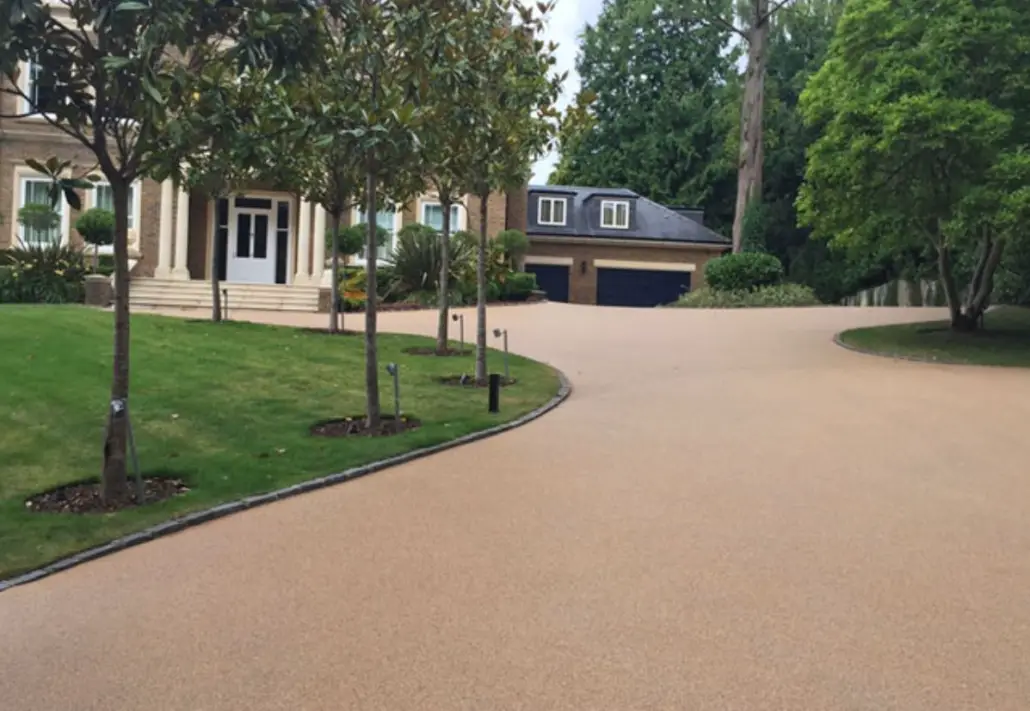
Q: What Are the Problems With Resin Driveways?
While installing a resin-bound surface, there are a variety of downsides that you can avoid. Common problems include damage from rain that comes out of nowhere, surface detachment or shading, reflective cracking, and iron spots.
Q: What Is the Lifespan of a Resin Driveway?
Driveways that are resin-bound tend to last for a very long time. The period for a guarantee can range from ten to twenty years. Its useful life span could reach twenty-five years in the hands of a competent installer and caretaker. In contrast to traditional driveways, a resin-bound one needs almost no upkeep.
Q: How Much Weight Can a Resin Driveway Take?
Because the stone used is hard and the mixture is made in a certain way, a resin driveway can handle both cars and people, even when heavier vehicles are on it. Resin is very helpful for properties that have more than one car or need to store a car with a high load capacity.
Given that the average estimated weight of a vehicle is 1.4 tons, and generally, large vans are around 3.5 tons, you can see why it is a popular choice.
Q: Can Resin Driveways Be Jet Washed?
Resin-bound flooring requires the occasional sweep and light pressure wash to maintain its pristine appearance. Be careful when working with surfaces made of resin because water can dissolve the material, ruining your floor or countertop.
Q: Do Weeds Grow Through Resin Driveways?
Since there are no crevices or loose stones, weeding and sweeping get reduced. As a maintenance tip, you should often power-wash your driveway and move your car to stop algae and moss from growing. You should also remove any stains or spills from your driveway.
Q: How Do You Maintain a Resin Driveway?
If your resin driveway doesn’t get as much use as others, you should still be mindful of the possibility of hard objects making contact with it. These include garden and vehicle machinery and garden accessories like planters and benches.
There’s also the risk of gravel or debris wedged between your tires’ treads. If you frequently use your car, it can leave permanent marks and scratches. Resin-bound surfaces are susceptible to damage from tires as well.
Q: Do Resin Drives Sink?
There will be no sinking, loose pebbles, or puddles. Compared to traditional gravel driveways, resin-bound driveways are easy on the feet and provide a safe surface. Since the resin adheres to the stones, there will be no more scattered rocks.
They are low-maintenance and look good because the stones do not move around on the driveway’s surface. Regular sweeping and washing will keep your new driveway looking great.
Q: Why Has My Resin Drive Cracked?
The most common cause of a crack that grows to the surface is movement in the sub-base. Holes can appear in your driveway if you use the wrong resin, stone combination, or low-quality resin.
A professional installer will use more than a cement mixer to ensure the right amount of stone to resin. They often prime the concrete subfloor to keep it from getting dirty and breaking down.
Conclusion
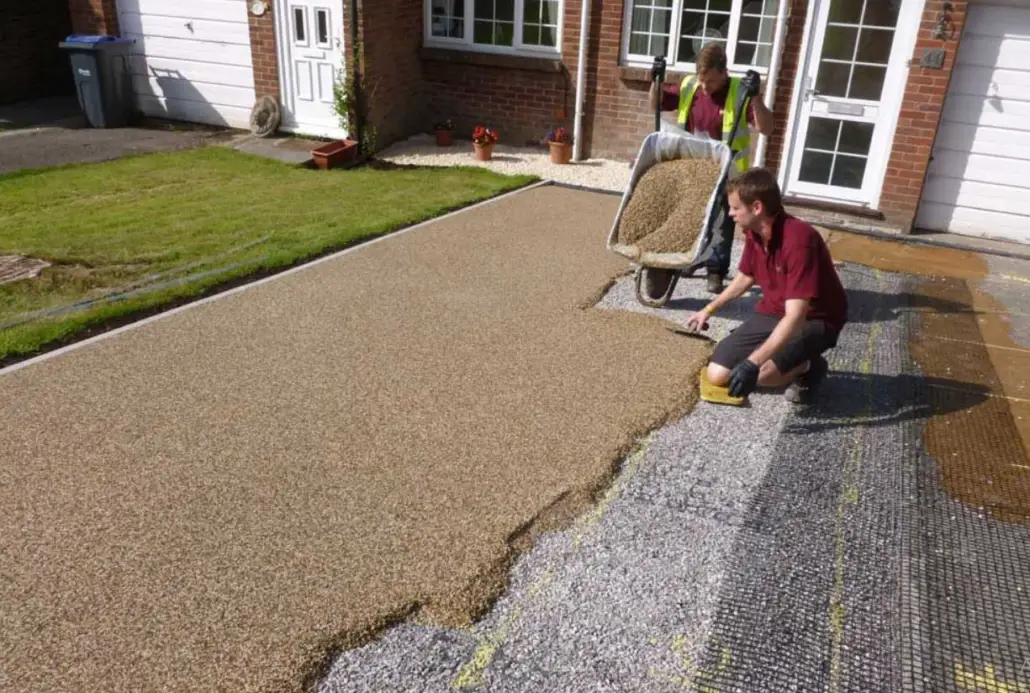
If you weigh the benefits of installing a resin driveway against its drawbacks, you will find that the benefits are much greater. You can avoid many possible problems by taking the necessary maintenance steps.
You can, therefore, be confident that a resin driveway will serve its purpose well, add beauty and improve the value of your home.


